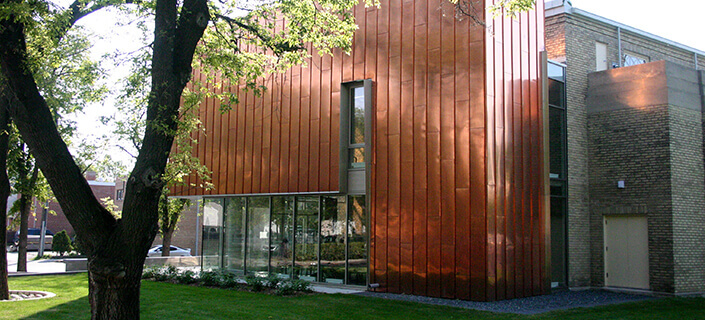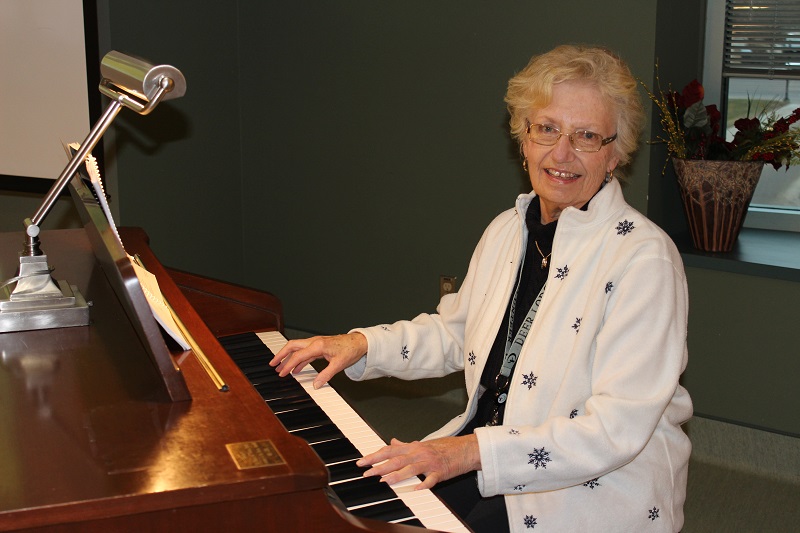
Pet Visitors like Maggie, seen here with Doug, are important members of Deer Lodge’s volunteer team.
Deer Lodge Centre’s animal volunteers bring joy, happy memories to residents
Teri Stevens
When Maggie arrives for a visit, the joy on Doug Thomas’s face says it all. “She makes me feel connected to the world.” A four-year-old border collie mix, Maggie looks just as happy to see Doug as she showers his face with kisses. Doug, a long-term care resident at Deer Lodge Centre, closes his eyes and hugs her close. “I hope you know how much you brighten my day.” Maggie’s tail thumps rapidly.
Ursula, Maggie’s human, has been bringing her animals to Deer Lodge for 18 years. Maggie visits Doug once a week, along with her many ardent fans in the physiotherapy unit and other residents living on Lodge 4 West. “They adore her sweet and gentle disposition. She loves cuddling and giving kisses,” says Ursula.
A soft snout nuzzling your hand; a purring ball of fur curled up in your lap: anyone who has ever shared their life with a companion animal or pet knows the special joy, comfort, and companionship an animal can bring.
A companion animal is defined as any animal who shares their life with a human caregiver for company, amusement, work, or psychological support. In healthcare, companion animals often participate in animal-assisted therapy or interventions. Some make regular visits to liven the spirits of patients and residents, such as the visits that take place at Deer Lodge as part of the centre’s Pet Visitor program.
“Our volunteers come in all shapes, colours and sizes. The human half of our Pet Visitors program is important, but it’s the animals that really steal the show,” says Joy Tanchuk, volunteer supervisor at Deer Lodge. “The animals have a natural way of lifting the atmosphere around them. They can help distract from worries and pains. They’re entertaining company. They reduce stress, boost feelings of comfort and caring.”
Tanchuk’s view is supported by ample evidence. Researchers continue to demonstrate how interactions with companion animals have a positive impact on people’s physical health by:
- Helping us stay active and prolonging our ability to perform the activities of daily living as we age
- Decreasing stress and increasing levels of neurochemicals linked to relaxation and bonding
- Providing structure and a sense of purpose to our days
Pets and companion animals also pro-vide psychological or emotional benefits, too, by:
- Reducing agitation and aggression in people living with dementia
- Decreasing depression, anxiety and loneliness
- Providing social contact, and comfort and companionship when someone loses a spouse
These benefits aren’t reserved for larger animals like cats and dogs. One study found that adding fish tanks into the dining rooms of Alzheimer’s/dementia residential units increased residents’ nutritional intake significantly.
Visits from animal volunteers have another important benefit: they often prompt patients and residents to reminisce about their own pets and share warm memories of times past.
Doug, while cuddling Maggie, recalls his corgi Snowball, and the day she met Her Majesty Queen Elizabeth II during one of her Royal visits to Winnipeg. When the Queen’s car passed Doug and Snowball on the sidewalk on their way to a special event, the Queen—a corgi devotee—waved for the driver to slow. The window opened and the Queen looked out; Snowball bared her teeth and growled. “I reminded Snowball who she was speaking to, and suddenly she stopped growling and wagged her tail,” says Doug. The Royal hand gave a final wave and the car continued on its way.
Deer Lodge Centre’s Pet Visitors pro-gram currently has 10 volunteers—all of them dogs at the moment, although the program is open to considering other animals.
“We look for animals who have a good temperament: they’re calm, gentle, friendly, well-behaved, interested in people, do not jump, and listen well to their owners,” says Tanchuk.
Just like their human counterparts, the animals are interviewed by Tanchuk to determine their suitability before they’re approved for duty. Some animal volunteers have already received train-ing through the St. John’s Ambulance Therapy dog program and arrive with a well-recognized seal of approval.
“I once read somewhere that positive interaction with pets translates into positive interactions with humans, and I believe this to be true,” says Tanchuk. “Our animal friends make us better people. Definitely happier people.”
If you and your animal would like to volunteer for Deer Lodge Centre’s Pet Visitor program, call Joy Tanchuk at 204.831.2912.
Recent News

Embracing Hope: The Impact of DLC’s Movement Disorder Clinic

Winnipeg Jets Parkinson’s Disease Awareness Game!

